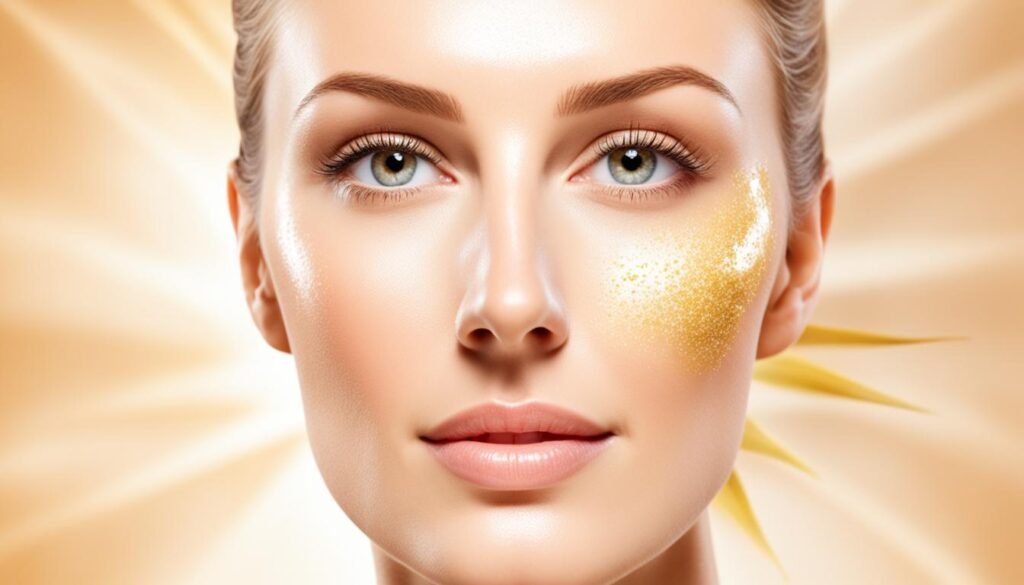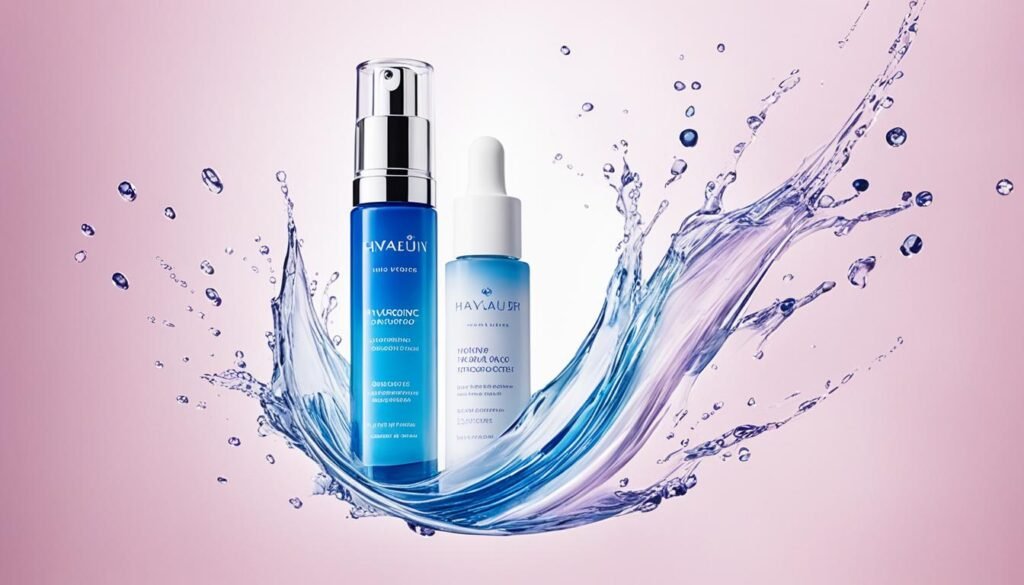Welcome to our comprehensive guide on unlocking the beauty of smooth skin! If you’ve ever wondered how to achieve a radiant and flawless complexion, you’re in the right place. In this article, we will share expert tips and advice to help you transform your skincare routine and reveal the smooth skin you deserve.
Smooth skin not only looks stunning but also boosts your confidence and makes you feel your best. Whether you’re dealing with dryness, oiliness, or specific skin concerns, our expert tips will provide you with the knowledge and techniques to achieve the smoothest skin possible.
From understanding your skin type and implementing effective exfoliation techniques to finding the right sunscreen and nourishing your skin from within, we’ve got you covered. We’ll also explore targeted solutions for specific skin concerns, share skincare secrets for flawless skin, and provide additional steps to enhance your routine.
Choosing the right skincare products for your skin type and matching your skin tone is essential. We’ll guide you through the process of selecting products that align with your needs and deliver the best results for smooth and radiant skin.
To round out our comprehensive guide, we’ll also discuss the impact of factors like sleep and overall well-being on the health and appearance of your skin. Achieving smooth skin is not only about the right products and routines but also about taking care of yourself holistically.
Key Takeaways:
- Understanding your skin type is crucial for developing an effective skincare routine.
- Regular exfoliation helps remove dead skin cells and promotes a smoother complexion.
- Always protect your skin from harmful UV rays by using sunscreen with an appropriate SPF.
- A balanced diet rich in vitamins C and E and omega-3 fatty acids contributes to smooth and healthy skin.
- Hydration is key for achieving and maintaining smooth skin. Drink plenty of water and use hydrating products with ingredients like aloe vera.
Understanding Your Skin: The Key to Unlocking Smoothness
To achieve and maintain smooth skin, it is essential to understand your skin type and tailor your skincare routine accordingly. Your skin type plays a significant role in determining the best approach to skincare, from addressing specific concerns to achieving a healthy complexion.
First and foremost, let’s discuss the different skin types: dry, oily, and combination. Dry skin tends to lack hydration, resulting in a tight and sometimes flaky complexion. On the other hand, oily skin often produces excess sebum, leading to a shiny and potentially acne-prone appearance. Combination skin features both dry and oily areas, requiring a balanced approach. By identifying your skin type, you can make informed choices when selecting skincare products and establishing a skincare routine.
Developing a consistent skincare routine is crucial for promoting smooth skin. Cleansing, toning, moisturizing, and protecting your skin from harmful UV rays are fundamental steps in any skincare routine. However, the specific products and steps may vary depending on your skin type. Here is a breakdown of the skincare routine for different skin types:
Hydration Tips for Dry Skin
If you have dry skin, the key is to replenish moisture and maintain hydration. Opt for gentle cleansers that do not strip away natural oils. Look for moisturizers with hydrating ingredients, such as hyaluronic acid, glycerin, or ceramides. These ingredients help retain moisture in the skin, leading to a smoother complexion. Additionally, consider incorporating a hydrating serum or facial oil into your routine to provide an extra boost of moisture.
Balancing Oiliness in Oily Skin
If you have oily skin, controlling excess oil production is essential for achieving smoothness. Use oil-free cleansers and lightweight, non-comedogenic moisturizers to avoid clogging pores. Exfoliating regularly can help remove dead skin cells and prevent the buildup of sebum. Look for exfoliators with ingredients like salicylic acid or gentle physical exfoliants. Incorporating a clay-based mask into your skincare routine once or twice a week can also help absorb excess oil.
Understanding your skin type and implementing a tailored skincare routine are the first steps toward unlocking smoothness. Whether you have dry, oily, or combination skin, targeting specific concerns and maintaining hydration are key. By customizing your approach to skincare, you can achieve a healthy complexion and enjoy the beauty of smooth skin.
Exfoliation: Say Goodbye to Dead Skin Cells
Exfoliation is a crucial step in achieving smooth and radiant skin. By gently removing dead skin cells from the surface, exfoliation reveals a fresh and glowing complexion. Incorporating exfoliation into your skincare routine can help address various skin concerns, improve texture, and promote a more youthful appearance.
There are different methods of exfoliation, including physical and chemical exfoliants. Physical exfoliants use granules or brushes to manually slough off dead skin cells, while chemical exfoliants such as AHAs or BHAs dissolve the bonds holding dead skin cells together.
One effective way to enhance the exfoliation process is by using serums. Serums are lightweight formulations packed with active ingredients that penetrate deeply into the skin. By incorporating a serum during your exfoliation routine, you can deliver additional nutrients and hydration to support skin health.
“Exfoliation can be quite invigorating. It wakes up the skin and promotes a smoother, brighter complexion.”
Another popular approach to exfoliation is through facials. Facials provide a professional treatment that combines exfoliation, deep cleansing, and nourishing ingredients tailored to your skin’s specific needs. Whether you choose an at-home facial or visit a spa, facials can be a rejuvenating experience that leaves your skin looking and feeling revitalized.
After exfoliating, it’s essential to moisturize your skin. Exfoliation can temporarily strip the skin of its natural oils, making it crucial to replenish moisture afterwards. Using a hydrating moisturizer helps restore the skin’s balance and prevents dryness or irritation.

| Benefits of Exfoliation | Serums for Enhanced Exfoliation | The Importance of Moisturizing |
|---|---|---|
| • Removes dead skin cells • Improves skin texture • Enhances skin radiance • Reduces the appearance of fine lines and wrinkles |
• Serums deliver potent ingredients deep into the skin • Boost skin hydration and collagen production • Help address specific skincare concerns • Enhance the overall exfoliation process |
• Replenishes lost moisture • Restores the skin’s natural barrier • Prevents dryness and irritation • Promotes a healthy and glowing complexion |
Sun Protection: Shielding Your Beauty Of Smooth Skin from Harmful UV Rays
When it comes to maintaining smooth and healthy skin, sun protection is absolutely crucial. Shielding your skin from harmful UV rays is not only essential for preventing sunburn and skin damage but also plays a significant role in preventing premature aging and reducing the risk of skin cancer.
One of the key components of sun protection is the use of sunscreen. Applying sunscreen with an appropriate SPF (sun protection factor) is vital in safeguarding your skin from harmful UV radiation. Dermatologists recommend applying a broad-spectrum sunscreen with an SPF of at least 30, which effectively shields against both UVA and UVB rays.
Skincare products with built-in sunscreen protection are widely available on the market. These products offer the convenience of combining sun protection with your regular skincare routine. Look for moisturizers, foundations, and daily moisturizers that have an SPF of 30 or higher to ensure your skin is adequately shielded from the damaging effects of the sun.
However, it’s important to remember that sunscreen should not be your only line of defense against the sun’s harmful rays. Taking additional precautions, such as seeking shade during peak sun hours and wearing protective clothing, can further enhance your sun protection.
“Sunscreen should be seen as an essential part of your daily skincare regimen. It not only helps protect your skin from the harmful effects of UV radiation but also helps in preventing premature aging.”
Consulting with a dermatologist can provide invaluable guidance on the most suitable sunscreen and sun protection practices for your skin type. Dermatologists have specialized knowledge and expertise in skincare and can recommend specific products and routines tailored to your individual needs.
The Importance of Sunscreen Application
Applying sunscreen correctly is key to ensuring optimal sun protection. It’s essential to follow these guidelines:
- Apply a generous amount of sunscreen to cover all exposed skin.
- Reapply sunscreen every two hours, or more frequently if you’ve been swimming, sweating or towel-drying.
- Pay attention to often overlooked areas such as the ears, neck, and lips, which are prone to sun damage.
Remember that sunscreen is not just for sunny days; it should be part of your daily skincare routine, even on cloudy or overcast days. UV rays can still penetrate through clouds, causing damage to your skin.
Choosing the Right SPF
Understanding the significance of SPF is essential in selecting the appropriate sunscreen for your needs. SPF indicates the level of protection against UVB rays, which are responsible for sunburn. The higher the SPF, the greater the protection. Here’s a quick breakdown:
| SPF Level | Sunburn Protection |
|---|---|
| 15 | Offers good protection against sunburn |
| 30 | Offers high protection against sunburn |
| 50 | Offers very high protection against sunburn |
| 50+ | Offers the highest protection against sunburn |
While higher SPF levels provide increased protection, it’s important to note that no sunscreen can offer complete protection from the sun’s UV rays. It’s still crucial to take additional sun protection measures such as seeking shade, wearing sun-protective clothing, and avoiding prolonged sun exposure.

Nourishment from Within: A Balanced Diet for Smooth Skin
When it comes to achieving smooth and radiant skin, it’s not just about the products you apply externally. Nourishment from within plays a vital role in maintaining a healthy complexion. A balanced diet that includes essential nutrients can work wonders for your skin’s health and appearance.
Achieving a balanced diet involves incorporating a variety of foods that provide the necessary vitamins and minerals to support skin health. Two essential vitamins for smooth skin are vitamin C and vitamin E. Vitamin C is known for its antioxidant properties, which help combat free radicals and promote collagen production. Vitamin E, on the other hand, helps moisturize and protect the skin from damage caused by sun exposure.
Omega-3 fatty acids are another crucial component of a balanced diet for smooth skin. These healthy fats help maintain the skin’s hydration and reduce inflammation, contributing to a supple and youthful appearance. You can find omega-3 fatty acids in oily fish like salmon, mackerel, and sardines.
One simple way to incorporate these essential nutrients into your diet is by consuming brightly colored fruits and vegetables. These vibrant foods are rich in vitamins, minerals, and antioxidants that promote skin health. Examples of brightly colored fruits include berries, citrus fruits, and papaya.
“A balanced diet not only benefits your overall health but also has a significant impact on the quality of your skin.” – Dr. Sarah Thompson, Dermatologist
Ensuring a balanced diet for smooth skin doesn’t mean you have to make drastic changes to your eating habits. Start by gradually including more fruits, vegetables, and omega-3-rich foods into your meals. Consider the following example of a balanced meal plan for smooth skin:
Table: Balanced Diet for Smooth Skin
| Meal | Ingredients |
|---|---|
| Breakfast | Spinach and mushroom omelette with a side of mango |
| Lunch | Grilled salmon with quinoa and steamed asparagus |
| Snack | A handful of mixed berries |
| Dinner | Chicken stir-fry with bell peppers, broccoli, and brown rice |
By following a balanced diet that includes vitamins C and E, omega-3 fatty acids, and brightly colored fruits, you can nourish your skin from within and support a glowing complexion. Remember, healthy skin starts with a healthy diet!

Hydration: Quenching Your Skin’s Thirst
When it comes to achieving smooth skin, proper hydration is key. Drinking plenty of water and using hydrating products can have a profound effect on the health and appearance of your skin. In this section, we will explore the importance of hydration and how it can help you achieve a smooth complexion.
The Benefits of Hydration
Drinking plenty of water is essential for maintaining optimal skin health. Water helps to flush out toxins, keep your skin hydrated from the inside out, and improve cell turnover, which is crucial for achieving a smooth complexion. By staying hydrated, you can support the natural rejuvenation and repair processes of your skin.
Using hydrating products that contain ingredients like aloe vera can also help replenish and moisturize your skin. Aloe vera is known for its soothing and hydrating properties, making it an excellent addition to your skincare routine. Look for skincare products that contain aloe vera to help quench your skin’s thirst and promote smoothness.
Cell Turnover and Smooth Skin
Cell turnover is the process by which old skin cells are shed and replaced with new ones. This process is crucial for maintaining a smooth complexion and preventing dullness and roughness. Proper hydration plays a significant role in supporting healthy cell turnover, as it helps to keep your skin barrier strong and plump.
Drinking plenty of water can help improve the rate of cell turnover, allowing fresh, radiant skin cells to come to the surface. Hydration also supports the skin’s natural exfoliation process, helping to slough off dead skin cells and reveal the smoother, brighter skin underneath.

Aloe vera is a plant extract that has been used for centuries in skincare due to its numerous benefits for the skin. It contains vitamins, minerals, and antioxidants that help hydrate the skin and promote cell turnover. Incorporating aloe vera-based products into your skincare routine can help improve your skin’s hydration and overall smoothness.
“Proper hydration plays a significant role in supporting healthy cell turnover, as it helps to keep your skin barrier strong and plump.”
Targeted Solutions: Addressing Specific Skin Concerns
When it comes to achieving and maintaining smooth skin, addressing specific skin concerns is key. Whether you’re dealing with skin conditions, fine lines, wrinkles, or dryness, targeted solutions can make a significant difference in improving the overall health and appearance of your skin.
Tackling Skin Conditions
If you’re struggling with skin conditions such as acne, rosacea, or eczema, it’s essential to tailor your skincare routine to address these specific concerns. Consult with a dermatologist to determine the best course of action, including the right products and ingredients to use. Incorporating gentle cleansers, soothing moisturizers, and targeted treatments can help alleviate symptoms and promote a healthier complexion.
Reducing the Appearance of Fine Lines and Wrinkles
Fine lines and wrinkles are common signs of aging that many of us want to minimize. Fortunately, there are targeted solutions available to help reduce their appearance. Look for skincare products that contain ingredients like retinol, peptides, and antioxidants, which can help boost collagen production and improve skin elasticity. Incorporating these products into your skincare routine can help smooth out fine lines and wrinkles, revealing a more youthful-looking complexion.
“When it comes to addressing fine lines and wrinkles, consistency is key. Make sure to follow a regular skincare routine and be patient; results may take time to show.” – Dr. Sarah Johnson, Dermatologist
Utilizing the Power of Hyaluronic Acid
Hyaluronic acid is a powerhouse ingredient when it comes to hydrating and plumping the skin. It has the ability to hold up to 1000 times its weight in water, making it an excellent choice for addressing specific skin concerns like dryness and dullness. Look for skincare products that contain hyaluronic acid, such as serums, moisturizers, and masks, to help replenish moisture levels and improve overall skin texture.

Customizing Your Skincare Routine
Addressing specific skin concerns requires a customized approach to your skincare routine. Take the time to understand your skin type and concerns, and choose products that target those specific needs. Whether it’s incorporating gentle exfoliators to improve skin texture or using targeted treatments for specific concerns, tailoring your skincare routine can make a significant difference in achieving smooth and healthy-looking skin.
Best Practices: Skincare Secrets for Flawless Skin
When it comes to achieving flawless skin, there are some tried and true skincare secrets that can make all the difference. Whether your skin lacks radiance, has uneven texture, or is sensitive, incorporating these best practices into your skincare routine can help you achieve the smooth and beautiful complexion you desire.
Improving Skin Texture
Smooth skin texture is the foundation of a flawless complexion. To improve your skin texture, exfoliation is key. Regularly exfoliate your skin to slough off dead skin cells and reveal fresh, radiant skin underneath. Look for exfoliators that are gentle on the skin and avoid harsh scrubbing that can damage the skin barrier. Additionally, consider incorporating serums into your skincare routine. Serums can help improve skin texture by delivering targeted ingredients deep into the skin.
Addressing Specific Skin Concerns
“Understanding your skin’s specific needs is crucial for addressing any skin concerns.”
Each individual’s skin is unique, and addressing specific skin concerns requires a tailored approach. Whether you’re dealing with fine lines, wrinkles, or dark spots, there are targeted solutions available. Look for skincare products that contain ingredients like hyaluronic acid for plumping and hydrating the skin, and retinol for reducing the appearance of fine lines and wrinkles. Remember to consult with a dermatologist for personalized advice.
Catering to Sensitive Skin
Sensitive skin requires extra care and attention. Avoid using skincare products that contain harsh chemicals or fragrances that can irritate the skin. Instead, opt for gentle and hypoallergenic products specifically designed for sensitive skin. Look for soothing ingredients like chamomile and aloe vera to calm and nourish sensitive skin. Additionally, it’s important to patch-test new products before incorporating them into your routine to ensure they won’t cause any adverse reactions.
To maintain flawless skin, remember to follow these skincare secrets: improve skin texture through exfoliation and the use of serums, address specific skin concerns with targeted solutions, and cater to the unique needs of sensitive skin. By implementing these best practices into your daily routine, you can unlock the secrets to achieving and maintaining flawlessly smooth skin.
Skincare Secrets Overview
| Skincare Secret | Benefits |
|---|---|
| Exfoliation | Removes dead skin cells, reveals radiant skin |
| Targeted Solutions | Addresses specific skin concerns like fine lines and wrinkles |
| Sensitive Skin Care | Gentle products for nourishing and soothing sensitive skin |
Enhancing Your Routine: Additional Steps to Achieving Smooth Skin
While following a skincare routine is essential for maintaining healthy skin, there are additional steps you can take to enhance your results and achieve smooth, glowing skin. Incorporating these practices into your daily routine can make a significant difference in the overall appearance and texture of your skin.
The Importance of Consistency
Consistency is key when it comes to skincare. Establishing a regular skincare routine and sticking to it is crucial for achieving smooth skin. Remember to cleanse, tone, and moisturize your skin regularly. Cleansing removes dirt and impurities, toning helps balance the skin’s pH levels, and moisturizing provides essential hydration.
“Consistency is key when it comes to skincare. Establishing a regular skincare routine and sticking to it is crucial for achieving smooth skin.”
The Secret to Achieving Smooth Skin: Exfoliation
Exfoliation is a game-changer when it comes to achieving smooth skin. By removing dead skin cells, exfoliation promotes cell turnover and reveals fresh, radiant skin. Incorporate exfoliators into your skincare routine, such as gentle scrubs or chemical exfoliants like alpha-hydroxy acids (AHAs) or beta-hydroxy acids (BHAs). Be sure to follow the instructions and avoid over-exfoliating, as it can lead to irritation.
Adding a Boost with Serums
Serums are concentrated formulas that target specific skincare concerns. By incorporating serums into your routine, you can address fine lines, uneven skin tone, or dryness. Look for serums containing ingredients like hyaluronic acid or vitamin C. Apply the serum after cleansing and toning, and follow up with a moisturizer to lock in the benefits.
Additional Tips for Achieving Smooth Skin
- Protect your skin from harmful UV rays by using sunscreen with a high SPF.
- Drink plenty of water to stay hydrated, as it helps maintain your skin’s natural moisture balance.
- Incorporate regular facial massages to stimulate blood circulation and promote a healthy glow.
- Consider incorporating face masks or treatments into your routine to provide additional nourishment and hydration.
By incorporating these additional steps into your skincare routine, you can enhance the smoothness and radiance of your skin. Remember, consistency and thoroughness are key to achieving long-lasting results. Take the time to care for your skin regularly, and you’ll notice the difference in no time.
Finding Your Perfect Match: Choosing Skincare Products for Smooth Skin
When it comes to achieving smooth and glowing skin, choosing the right skincare products is essential. However, with the multitude of options available on the market, finding the perfect match for your skin type and tone can be overwhelming. In this section, we will guide you through the process of selecting skincare products that are suitable for your specific needs.
Understanding Your Skin Type
Before diving into the world of skincare products, it’s crucial to understand your skin type. Knowing whether you have dry, oily, combination, or sensitive skin can help you narrow down the selection and choose products that cater to your skin’s unique requirements.
Matching Products to Your Skin Tone
In addition to considering your skin type, it’s important to take your skin tone into account when selecting skincare products. Different products work best for different skin tones, so finding ones that complement and enhance your natural complexion can lead to smoother and more radiant skin.
Seeking Expert Advice
If you’re unsure about which skincare products are suitable for your skin type and tone, don’t hesitate to seek advice from skincare professionals or dermatologists. They can assess your skin’s specific needs and recommend products that will help you achieve your desired results.
“Choosing skincare products that are suitable for your skin type and match your skin tone is crucial for achieving and maintaining smooth skin. Take the time to understand your skin’s needs and seek expert advice when necessary.”
By following these guidelines and carefully selecting skincare products that are suitable for your skin type and match your skin tone, you can create a skincare routine that addresses your specific needs and leads to smoother, more radiant skin.
Beauty Sleep and Beyond: Considerations for Healthy and Radiant Skin
When it comes to achieving and maintaining healthy and radiant skin, getting enough sleep plays a vital role. Sleep is not only crucial for our overall well-being, but it also directly impacts the appearance of your skin. Lack of sleep can lead to dullness, dark circles, and even breakouts, while quality sleep contributes to a refreshed and rejuvenated complexion.
Adequate sleep is essential for the well-being of your skin. During sleep, your body goes into repair mode, allowing for cell renewal and regeneration. This process is especially important for your skin, as it helps to repair any damage caused by environmental factors or daily stressors. Sufficient sleep allows your skin to restore itself, resulting in a healthier and more youthful look.
Additionally, when you don’t get enough sleep, it triggers an increase in the stress hormone cortisol. Elevated cortisol levels can lead to inflammation, which can manifest as redness, acne, and other skin conditions. On the other hand, when you prioritize your sleep, you help keep cortisol levels in check, promoting a calmer and more balanced complexion.
So, how much sleep is enough? While individual needs may vary, experts generally recommend adults aim for 7-9 hours of quality sleep each night. Establishing a consistent sleep routine, creating a relaxing sleep environment, and practicing good sleep hygiene can all contribute to a better night’s rest.
Remember:
Beauty sleep is not just a saying; it’s a crucial step in your skincare routine. Prioritize enough sleep to benefit both your overall well-being and the appearance of your skin.
Aside from getting enough sleep, there are additional considerations that can contribute to the well-being of your skin. Proper hydration is key as it helps maintain skin elasticity, plumpness, and a healthy glow. Drinking plenty of water throughout the day can help ensure your skin stays moisturized from within.
Furthermore, incorporating stress-reducing activities into your routine can have a positive impact on your skin. Stress can exacerbate existing skin conditions and contribute to premature aging. Engaging in activities such as yoga, meditation, or enjoying hobbies can help reduce stress levels, promoting a healthier complexion.
Overall, achieving healthy and radiant skin goes beyond skincare products and routines. Prioritizing enough sleep and taking care of your overall well-being are crucial steps in attaining and maintaining beautiful skin.
Benefits of Beauty Sleep for Your Skin:
| Benefits | Description |
|---|---|
| Enhanced cell regeneration | Allows for skin repair and renewal |
| Reduced inflammation | Decreases the risk of redness, acne, and other skin conditions |
| Improved elasticity | Maintains the firmness and plumpness of the skin |
| Youthful complexion | Contributes to a refreshed and rejuvenated look |
| Reduced stress levels | Promotes a calmer and more balanced complexion |
Conclusion
In conclusion, achieving and maintaining smooth skin requires a combination of expert tips, a tailored skincare routine, and a focus on overall health and well-being. By understanding your skin type and using appropriate products, exfoliating to remove dead skin cells, protecting against harmful UV rays, nourishing your skin from within with a balanced diet and hydration, addressing specific concerns, following best practices, and enhancing your skincare routine, you can unlock the beauty of smooth skin and enjoy a radiant complexion.
Remember to choose skincare products that are suitable for your skin type and match your skin tone, as well as prioritize getting enough sleep and prioritizing the well-being of your skin. By incorporating these strategies into your daily life, you can achieve and maintain the smooth, healthy, and glowing skin that you desire.
Now that you have gained the knowledge and guidance provided in this comprehensive skincare routine guide, it’s time to take action and embark on your journey to smooth skin. Start implementing these expert tips today and watch as your complexion transforms into the radiant and youthful beauty you deserve.
Also Read : The Ultimate Guide To Achieving Radiant Skin At A Skin Care Center
FAQ
What are some expert tips for achieving smooth skin?
Some expert tips for achieving smooth skin include understanding your skin type, exfoliating regularly, using serums and moisturizers, protecting your skin from UV rays, maintaining a balanced diet, staying hydrated, addressing specific skin concerns, following skincare secrets, enhancing your skincare routine, choosing suitable skincare products, and prioritizing sleep and overall well-being.
How can I understand my skin type and improve my skincare routine?
Understanding your skin type is essential for a tailored skincare routine. You can determine your skin type by observing its behavior throughout the day and noting any specific concerns or characteristics. Once you know your skin type, you can select appropriate products and develop a routine that addresses your skin’s specific needs, such as hydrating dry skin or controlling oiliness in oily skin.
Why is exfoliation important for achieving smooth and radiant skin?
Exfoliation is crucial for achieving smooth and radiant skin because it helps remove dead skin cells that can make the complexion appear dull and uneven. Regular exfoliation also promotes cell turnover, revealing fresher, healthier skin. Additionally, the use of serums and moisturizers after exfoliation can further enhance the skin’s radiance and hydration.
How can I protect my skin from harmful UV rays?
Protecting your skin from harmful UV rays is vital to maintaining its smoothness and overall health. Use a broad-spectrum sunscreen with a suitable SPF every day, even on cloudy days, and reapply it every two hours. It’s also advisable to wear protective clothing, such as hats and sunglasses, and seek shade during peak sun hours. Consulting with a dermatologist can help you choose the right sunscreen and understand your skin’s sun protection needs.
Can nutrition play a role in achieving smooth skin?
Yes, a balanced diet can contribute to smooth skin. Consuming vitamins C and E, which are found in foods like citrus fruits and nuts, respectively, can help protect against free radical damage and promote collagen production. Including brightly colored fruits in your diet can provide antioxidants that nourish the skin. Additionally, omega-3 fatty acids, found in fish and flaxseeds, can help maintain skin health and promote a natural glow.
How does hydration impact the smoothness of the skin?
Hydration is essential for achieving smooth skin. Drinking plenty of water helps maintain the skin’s moisture balance and supports optimal cell function. Using hydrating skincare products, such as those containing aloe vera, can further quench the skin’s thirst and promote a healthy complexion. Hydration also plays a role in ensuring proper cell turnover, which contributes to smooth and glowing skin.
How can I address specific skin concerns, such as fine lines and wrinkles?
To address specific skin concerns like fine lines and wrinkles, incorporating products with ingredients like hyaluronic acid into your skincare routine can help hydrate the skin and minimize their appearance. Additionally, an effective skincare routine should include products tailored to your specific skin concerns, such as retinol for anti-aging benefits or ingredients that promote collagen production.
Are there any skincare secrets for achieving flawless skin?
Some skincare secrets for achieving flawless skin include focusing on improving skin texture, addressing any specific concerns your skin may have, and using products specifically formulated for sensitive skin. It’s important to understand what your skin lacks and tailor your routine accordingly to achieve the desired results.
What additional steps can I take to enhance my skincare routine?
Enhance your skincare routine by practicing good habits such as cleansing and moisturizing your skin regularly, using exfoliators three times a week to remove dead skin cells, and incorporating hydrating serums and masks into your routine. These steps can help you unlock the secret to achieving and maintaining smooth skin.
How do I choose skincare products that are suitable for my skin type and match my skin tone?
To choose skincare products suitable for your skin type, it’s essential to consider factors such as your skin’s sensitivity, oiliness, dryness, or any specific concerns you may have. Matching your skin tone involves selecting foundation and other makeup products that blend seamlessly with your natural complexion. Consulting with a skincare professional or dermatologist can guide you in selecting products that address your specific needs and match your skin tone.
How does sleep and overall well-being affect the appearance of my skin?
Getting enough sleep and prioritizing overall well-being are crucial for healthy and radiant skin. During sleep, the skin undergoes repair and rejuvenation processes, leading to a refreshed appearance. Lack of sleep can cause the skin to appear dull and contribute to the formation of dark circles and fine lines. Additionally, taking care of your overall well-being through a balanced diet, exercise, and stress management can positively affect the health and appearance of your skin.




